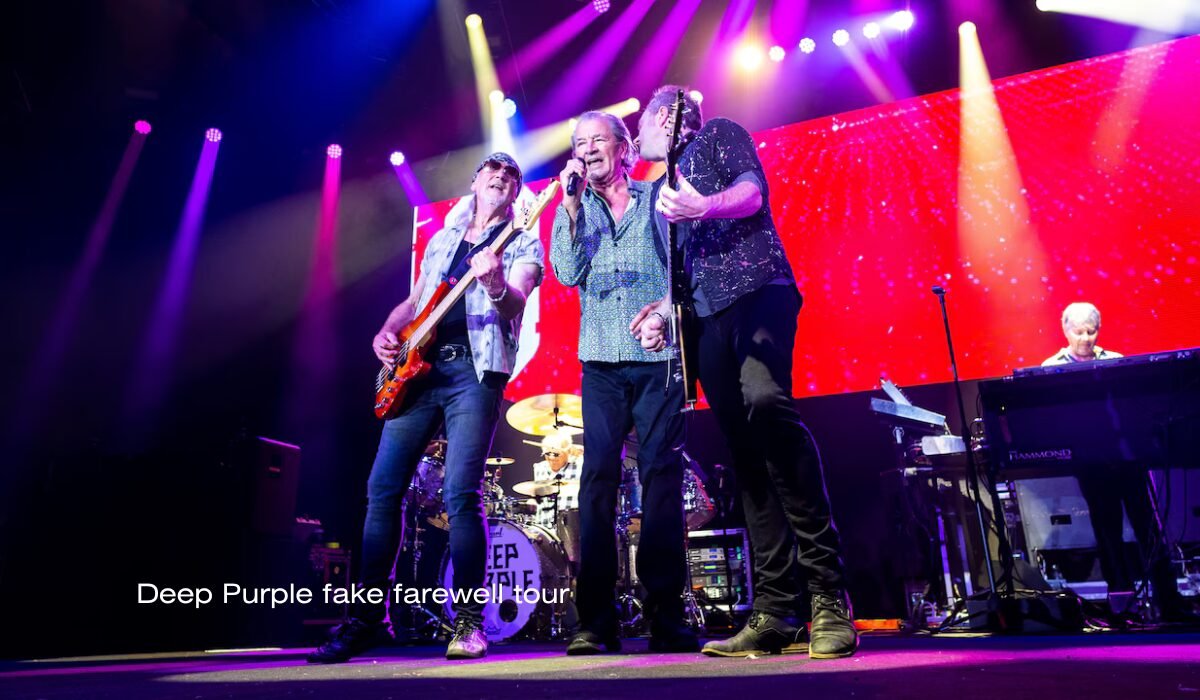Introduction
The period “Deep Purple fake farewell tour” has become an extensive problem with a variety among rock fans and music analysts alike. This technique, to begin with gaining interest because the band’s meant immensely last bow, has grown to be later exposed as a clever advertising tactic to enhance charge tag profits. Despite the uproar, Deep Purple stays a powerful stress in rock music, persevering to carry it out and pique audiences worldwide. In this blog, we will discover the phenomenon of the Deep Purple fake farewell tour, the band’s enduring legacy, and the location of their mythical guitarists who have averaged their iconic sound.
The Rise of Deep Purple
Deep Purple emerged on the song scene in 1968 with their right lineup, Mark I. The band featured Ritchie Blackmore on guitar and Rod Evans as the vocalist. Jon Lord played the keyboards, Ian Paice played the drums, and Nick Simper played the bass. Their combination of rugged rock and classical impacts quickly set them apart from their contemporaries. The band has come to be recognized for hit songs like “Smoke on the Water” and “Highway Star,” which, despite the fact, have resonated with fans in recent times.
Deep Purple’s effect on rock music is apparent. They are regularly credited with helping to pioneer the heavy metal style along with iconic bands like Led Zeppelin and Black Sabbath. Their songs’ complex preparations and revolutionary sound have stimulated infinite musicians and cemented their region in rock information.
Despite lineup adjustments through the years, Deep Purple has remained a regular presence on the track worldwide. Their capability to conform and evolve has allowed them to live relevantly and maintain their status, drawing in new generations of fanatics.
The Deep Purple Fake Farewell Tour Phenomenon
When the Deep Purple fake farewell tour was modified and first delivered, it sparked a flurry of emotions amongst fanatics. Many were saddened by the idea of never seeing the band perform live again, while others were intrigued by the possibility of experiencing their favored hits one last time. However, it quickly became apparent that the farewell tour had been modified to a different theme.
The method behind the Deep Purple fake farewell tour emerged as an excellent marketing and advertising and marketing flow designed to enhance price ticket earnings. By labeling the excursion as a farewell, the band created a sense of urgency among fanatics, prompting them to shop for tickets before they were too past due. This tactic, while controversial, proved to be a powerful alternative that could draw big crowds to their indicates.
The revelation that the farewell excursion was not real prompted mixed reactions from fanatics. Some felt deceived by the advertising ploy, while others preferred the opportunity to see the band perform live yet again. Despite the preliminary backlash, the tour’s success established the power of strategic naming and advertising in the trucking company.
The Tradition of Profound Purple’s Guitarists
Throughout their career, Profound Purple has been honored with a set of super guitarists who have made a permanent imprint on the band’s sound. Ritchie Blackmore, the genuine guitarist, became respected for his virtuosic betting and progressive utilization of old-style music components in rock. His contributions laid the foundation for Deep Purple’s signature sound.
Steve J. Morse, born on July 28, 1954, is a distinct legendary guitarist who has completed a massive feature in the band’s statistics. Known for his versatility and influential career, Morse added a sparkling attitude to Deep Purple’s tracks, assisting them to keep conform and live relevant inside the present-day music scene.
These days, Simon McBride, born on April 9, 1979, has joined the ranks of Deep Purple guitarists. A splendid musician in his own right, McBride is known for his dynamic performances and super career. His addition to the band has strengthened their lineup, ensuring that Deep Purple’s tunes continue to captivate audiences.
Remembering Tommy Bolin
Tommy Bolin, each extraordinary influential guitarist in Deep Purple’s history, had a tragically short but impactful profession. Born on August 1, 1951, Bolin became an incredibly talented American guitarist whose artwork spanned tremendous bands and solo obligations. Despite his premature loss of life on December four, 1976, Bolin impacted Deep Purple, and the music world stayed massive.
Bolin’s time with Deep Purple has come to be short, but his contributions to the band’s sound were massive. His ability to combine numerous musical patterns and create progressive compositions helped push the band’s track in new commands. Today, Bolin’s legacy lives on through his recordings and his effect on the musicians who followed in his footsteps.
The Memorable Verona Concert
One of the most memorable activities in Deep Purple’s statistics was modified into their overall performance in Verona on July 7, 2011. This regular, ordinary performance emerged as a standout second for the band and their lovers, offering an unforgettable encore that left an extended-lasting impact on all who attended.
The Verona live performance showcased Deep Purple’s capacity to captivate audiences with its effective stage presence and masterful musicianship. It also highlighted the band’s commitment to delivering excellent performances, even after a long time in the tune commercial enterprise employer.
Like many others, this live average overall performance demonstrates Deep Purple’s strength of mind to their lovers and their love for performing stay. Despite the talk surrounding the fake farewell excursion, the band’s passion for music and ability to connect with audiences remains unwavering.
The Strategic Naming and Marketing of Tours
The Deep Purple faux farewell tour is an excessive example of how bands can use strategic naming, marketing, and advertising to interact with their target market and pressure charge tag income. By developing a feel of urgency and exclusivity, the band successfully garnered attention and stuffed live performance venues around the place.
This method is not specific to Deep Purple. Many bands and artists have employed similar tactics to enhance interest and attendance at their shows. While some may view those strategies as manipulative, they can also be effective ways for artists to keep relevance and continue sharing their music with fans.
In a hastily converting music company, strategic marketing and marketing are essential for artists seeking to stay aggressive and related to their goal market. The Deep Purple, a fake farewell excursion, serves as a reminder of the strength of creativity and innovation in promoting the song and appealing to enthusiasts.
Conclusion
The Deep Purple fake farewell excursion has become an amazing talking point amongst rock fans and song enterprise organization analysts. Despite the talk surrounding the tour’s legitimacy, it has raised interest in the band’s enduring legacy and continued relevance in the music industry.
Deep Purple’s capability to evolve over time is a testament to their skills and resilience. Their guitarists, past and present, have played an important function in shaping the band’s sound, leaving a protracted-lasting effect on the tune organization.
For lovers and novices alike, Deep Purple remains an image of innovation and excellence in rock songwriting. The lessons learned from their faux farewell excursion provide treasured insights for artists seeking to interact with their purpose market and leave a lasting impression.
In the surrender, the Deep Purple fake farewell excursion serves as a reminder that nothing is undoubtedly very last in the international of music. The band defies expectations, proving their track and legacy will continue for generations. So, allow’s preserve rocking and gambling the timeless music of Deep Purple, usually pushing boundaries and galvanizing destiny musicians. There is only sometimes any result in sight for this legendary band. Extended stay, Deep Purple!

